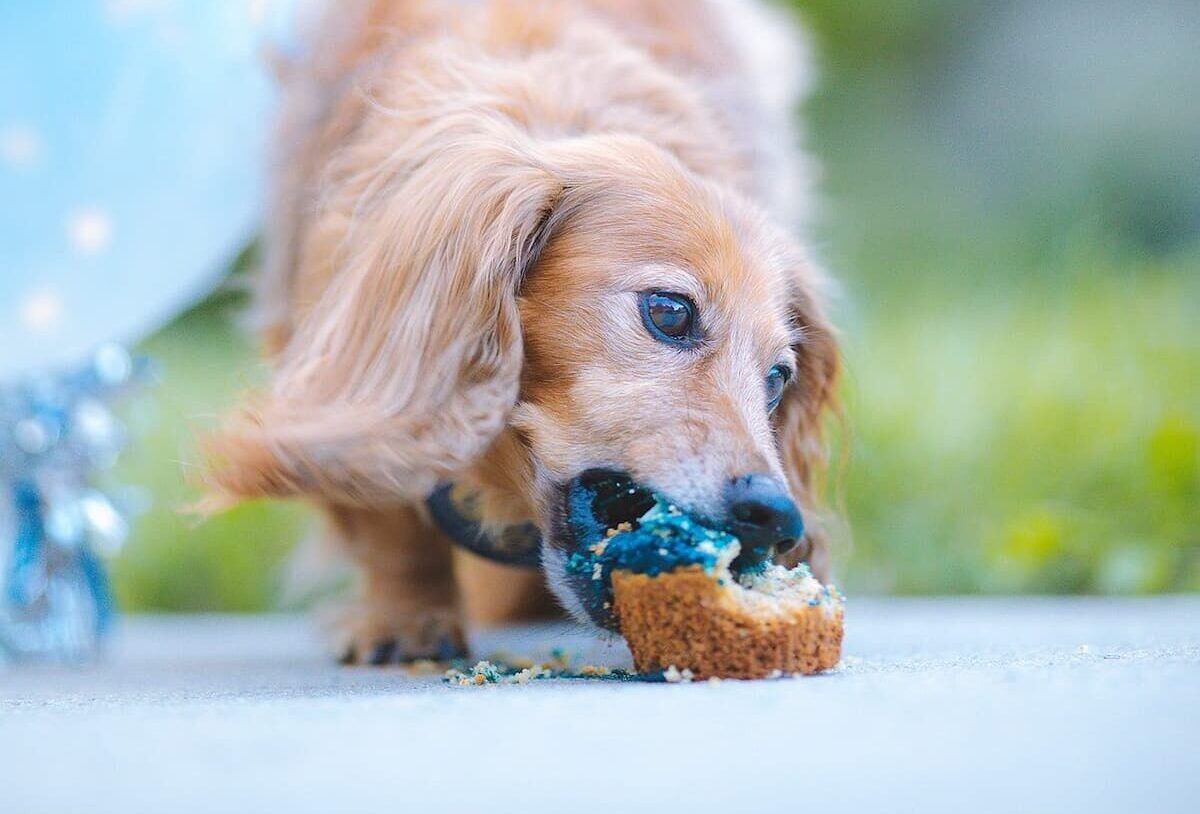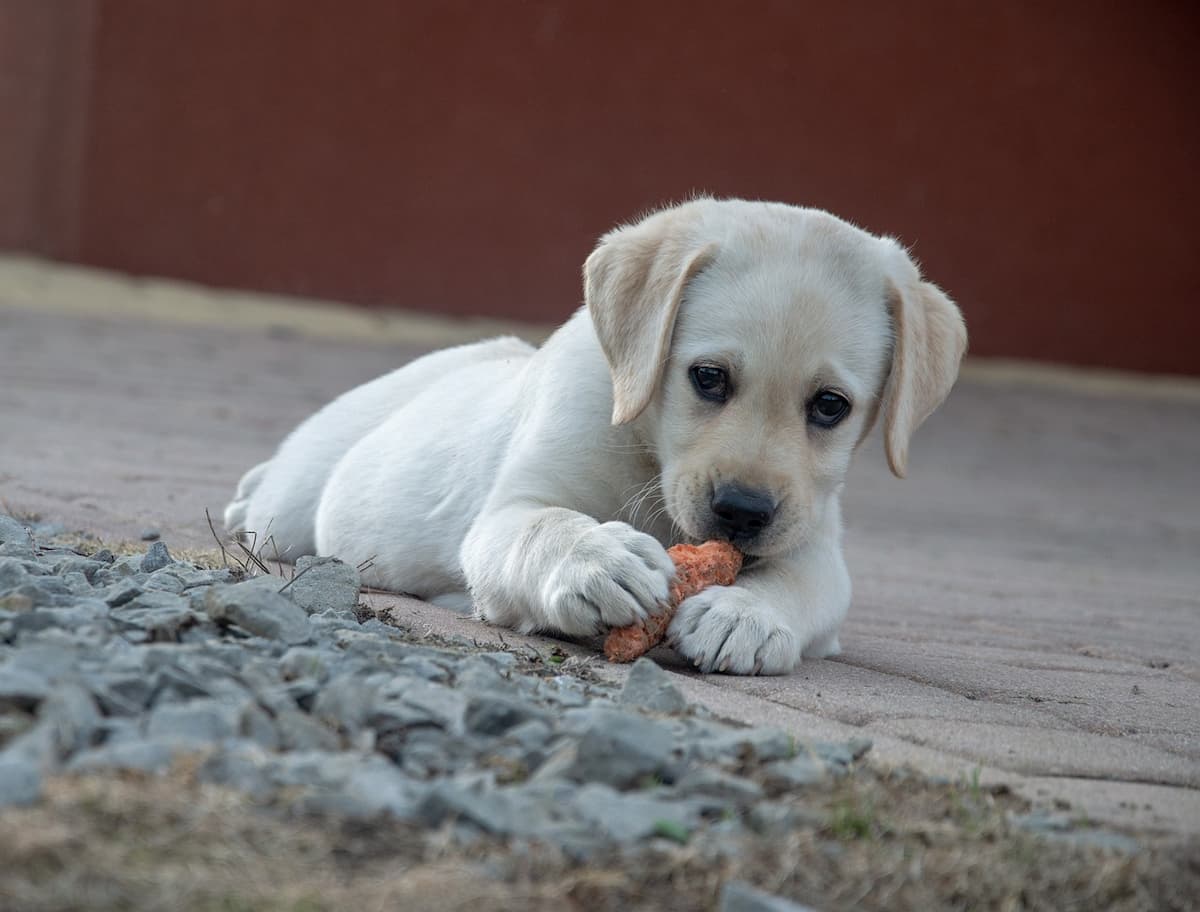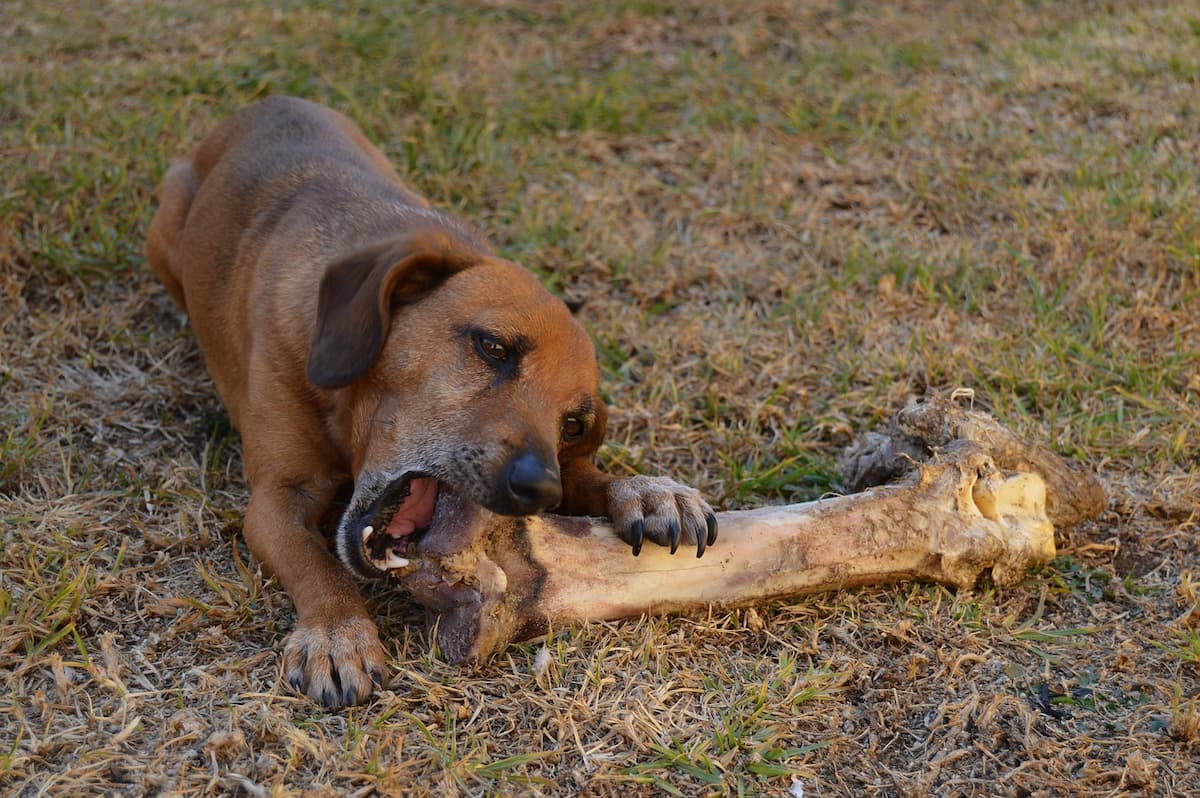Have you ever marveled at your furry friend’s uncanny ability to gobble up anything and everything they find on the ground?
From discarded food scraps to mysterious objects that seem straight out of a treasure hunt, dogs exhibit an insatiable curiosity when it comes to devouring the world beneath their paws.
But just why do they do it?
Why do dogs eat stuff off of the ground?
Read on to learn more about this seemingly disgusting eating habit.
Why do dogs have a tendency to eat everything they find on the ground?
Driven by the scavenger’s mentality and survival instincts
Dogs have an incredible ability to scavenge and eat anything they come across on the ground.
But why exactly do they even do this?
It all boils down to their evolutionary history and their survival instincts that have been ingrained in them over thousands of years.
First and foremost, dogs are curious creatures by nature.
They use their sense of smell to explore and understand the world around them.
When they come across something new on the ground, their initial instinct is to investigate and taste it.
It’s their way of gathering information and learning about their environment.
So, you can think of it as their version of a scientific experiment!
Secondly, this scavenger’s mentality our dogs have is because of their ancestors’ way of life.
Back in the days when dogs were wild animals, they had to fend for themselves in order to survive.
Thus, they had to search for food wherever they could find it, and this often meant scavenging for scraps and leftovers.
Another reason dogs tend to eat everything they find on the ground is simply because they are opportunistic eaters.
Dogs have evolved alongside humans for thousands of years, and during this time, they have become experts at scavenging for food.
This survival instinct kicks in when they come across something edible.
After all, you never know when your next meal might come along, right?
So, it’s no wonder they jump at the chance to gobble up anything tasty they find lying around.
Furthermore, dogs have highly developed survival instincts, and this also contributes to their tendency to eat anything on the ground.
Their instinctual drive to satiate their hunger and maintain their energy levels is so strong that it overrides any sense of caution.
This means that if they come across something that smells remotely edible, they are likely to gobble it up without a second thought, regardless of whether it’s actually safe for them to consume.
The role of sensory exploration: Understanding dogs’ need to investigate through taste and smell
Another reason for our dogs’ insatiable need to eat stuff off the ground is because of their keen senses.
One of the primary reasons dogs are so keen on investigating their surroundings through taste and smell is their incredibly sensitive sense of smell.
Just like how humans rely on their eyesight, dogs rely heavily on their sense of smell to gather information about the world around them.
In fact, their sense of smell is estimated to be up to 100,000 times more powerful than ours!
When a dog encounters something on the ground, whether it’s a random object or a clump of grass, they instinctively use their nose to gather information.
By sniffing and licking, they can detect a wealth of information, such as the presence of other animals, potential sources of food, or even the scent of danger.
It’s like their version of reading the news or checking social media – their way of understanding and connecting with the environment they live in.
So, next time you see your furry friend gobble up something questionable from the ground, remember that it’s just their way of exploring and making sense of the world around them!
Nutritional deficiencies and the urge to supplement their diet: How this can influence their eating habits
Our dogs’ strange eating habits could also be influenced by nutritional deficiencies.
Dogs are instinctively drawn to find alternative sources of nutrients when their bodies are lacking in essential vitamins and minerals.
This is especially common in dogs that have a poor diet or are not receiving a balanced meal plan.
One of the most common nutritional deficiencies in dogs is a lack of fiber.
Fiber plays a crucial role in maintaining a healthy digestive system and can be found in fruits, vegetables, and grains.
When a dog’s diet does not adequately provide this nutrient, they may go to great lengths to seek out fiber-rich sources.
This can result in them scavenging for fallen fruits, vegetables, or even munching on grass.
While these behaviors may seem strange, it’s their way of instinctively trying to supplement their diet and meet their nutritional needs.
Another common nutritional deficiency that can influence a dog’s eating habits is a lack of certain vitamins and minerals.
Dogs, just like humans, require a balanced intake of vitamins and minerals to support their overall health and well-being.
When their diet falls short, they may exhibit strange behaviors like eating dirt, rocks, or even their own feces. These unusual habits are often a way for dogs to compensate for the missing nutrients. It’s important to note that these behaviors are not just inconvenient but can also be harmful to their health.
Anxiety, boredom, and stress as underlying causes of extensive ground eating
Ground eating can be perplexing and even frustrating for dog owners, especially when it becomes excessive.
And while instincts or nutritional deficiencies can explain some cases, other times behavioral problems are to blame:
Anxiety: One possible underlying cause for dogs eating everything on the ground is anxiety. Dogs, like humans, can experience anxiety that manifests in various ways, including excessive licking, chewing, and eating.
When dogs feel anxious, they may seek comfort in chewing or eating objects they find on the ground.
This behavior can be a way for them to distract themselves from their anxiety or to release pent-up energy.
If your dog seems particularly anxious or stressed, it’s essential to consult with a veterinarian or a professional dog trainer to develop strategies to address their anxiety.
Boredom: Another factor that may lead dogs to eat everything on the ground is boredom.
Dogs require mental and physical stimulation to stay happy and healthy.
When they lack adequate mental and physical exercise, they may resort to engaging in destructive behaviors such as excessive ground eating.
If you notice that your dog is eating objects from the ground regularly, it could be a sign that they are not getting enough mental and physical stimulation.
To combat this, make sure to provide your dog with plenty of interactive toys, puzzles, and regular exercise to keep them mentally and physically engaged.
Stress: Stress is yet another potential cause for dogs obsessively eating things off the ground.
Dogs, just like humans, can experience stress in response to various triggers, such as changes in their environment or routine, new experiences, or interactions with other dogs or people. In these situations, dogs may resort to ground eating as a coping mechanism.
To help your dog manage stress, ensure they have a safe and quiet space to retreat to, provide them with positive reinforcement and rewards for calm behavior, and consider using calming aids or techniques recommended by a veterinarian.
Potential dangers and consequences for dogs that eat indiscriminately
While it can be both amusing and concerning to see our furry friends munching on seemingly random objects, this indiscriminate eating behavior can expose them to various hazards and health risks:
1. Foreign Objects: One of the major hazards of dogs eating indiscriminately is the ingestion of foreign objects.
Dogs have an unparalleled knack for finding objects that we wouldn’t even notice.
From sticks, stones, and plastic to socks, coins, and even dangerous chemicals, there’s no limit to what our curious canines might consume.
These foreign objects can get stuck in their digestive tract, leading to obstructions or tears, causing severe pain, discomfort, or even life-threatening emergencies.
2. Poisonous Substances: Another peril that lurks beneath their insatiable appetite is the potential ingestion of toxic substances.
Our surroundings are riddled with things that may be harmless to us but pose a significant threat to our furry companions.
Chocolate, xylitol, certain plants, medications, cleaning products, and even some human foods can be highly toxic to dogs.
Ingesting such substances can lead to poisoning symptoms, ranging from gastrointestinal distress, vomiting, and diarrhea to seizures, liver damage, or worse.
It’s crucial to keep a watchful eye on what our dogs put in their mouths to prevent accidental poisoning.
3. Bacterial Infections: Dogs that eat indiscriminately are also at a higher risk of bacterial infections.
Imagine your dog gleefully gobbling up that half-eaten sandwich left on the sidewalk.
While it may be a feast for them, it can also be a breeding ground for harmful bacteria like Salmonella or E.
coli.
Consuming contaminated food or waste can lead to digestive issues like gastroenteritis, causing symptoms such as vomiting, diarrhea, and abdominal pain.
It’s essential to provide a well-balanced and nutritious diet to our canine companions to minimize their desire for scavenging and reduce the risk of foodborne illnesses.
Tips to minimize ground eating: Practical recommendations for managing and modifying this behavior
Does your furry friend have a knack for devouring anything they find on the ground?
Don’t worry, you’re not alone! Many dog owners wonder why their pets have such a strong inclination to eat everything in sight.
From discarded food scraps to mysterious objects, it seems like their appetite knows no bounds.
While this behavior can be concerning, it’s essential to understand that it’s often rooted in natural instincts and curiosity.
That said, here are some useful tips to help you minimize your dog’s ground-eating tendencies:
1. Train the “Leave It” Command
Teaching your dog to “leave it” is a valuable command that can work wonders in curbing their ground-eating habit.
Start by holding a treat in your hand, then firmly say “leave it” while closing your hand.
Once your dog stops trying to get the treat, reward them with praise or another treat.
Gradually increase the difficulty by placing the treat on the ground and repeating the command.
With consistent practice, your pup will learn to resist the urge to gobble up random items they come across.
2. Provide Engaging Toys and Mental Stimulation
Boredom often contributes to a dog’s tendency to scavenge for food on the ground.
To keep their minds occupied and minimize this behavior, offer an array of engaging toys and puzzles that encourage mental stimulation.
Interactive toys, such as treat-dispensing balls or puzzle games, can provide hours of entertainment and help redirect their focus away from the ground.
Additionally, regular exercise and playtime will help keep your dog active and less likely to search for snacks elsewhere.
3. Monitor and Modify Their Environment
A proactive approach is crucial in managing your dog’s ground-eating behavior.
Keep a watchful eye on your surroundings during walks or visits to outdoor spaces, ensuring your dog doesn’t have easy access to potentially harmful items.
Avoid areas with excessive litter or rotting trash, as these can be tempting for even the most well-behaved pups.
If necessary, use a shortened leash or consider using a muzzle for extra precaution.
By modifying their environment and limiting their opportunities to scavenge, you can help prevent any potential mishaps.
FAQ
Q: Is this behavior a sign of hunger or nutritional deficiencies?
A: Not necessarily.
Most dogs, especially those who are well-fed and pampered, munch on ground treasures out of mere curiosity or habit.
While it’s unlikely to be a sign of hunger, it’s always a good idea to ensure your pup is getting a balanced diet to keep both their bellies and taste buds satisfied.
Q: Is eating things off the ground dangerous for dogs?
A: Unfortunately, yes.
Dogs have a remarkable talent for finding and devouring items that are anything but appetizing for us humans.
From decomposing food to discarded trash, their repertoire knows no bounds. Ingesting something unsuitable can lead to digestive issues, obstructions, or even poisoning.
So, it’s crucial to keep a watchful eye on your four-legged friend and make sure they avoid potentially harmful substances.
Q: How can I prevent my dog from eating everything they find?
A: Ah, the million-dollar question! Prevention is key.
Start with proper training and teach your dog the “leave it” or “drop it” commands.
These commands can be tremendously helpful in redirecting their attention away from ground treats. Additionally, always keep your pup on a leash during walks, so you have better control over their snacking spree.
Q: Are there any medical conditions that could cause dogs to eat everything?
A: While it’s often innocent curiosity or ingrained scavenging instincts that drive our dogs to be vacuum cleaners on legs, there are rare cases when medical conditions may be at play.
Conditions like pica, which causes dogs to eat non-food items compulsively, or certain nutrient deficiencies can explain this behavior.
If you’re concerned, it’s best to consult your dog’s veterinarian for a thorough examination.
Q: Can I train my dog out of this behavior?
A: With patience and consistent training, you can definitely curb this habit.
Teaching your dog the “leave it” command during walks or setting up controlled environments for training can be highly effective.
Remember, never scold your pup if they do manage to gobble up something they find on the ground but rather redirect their attention with a treat or toy.
Positive reinforcement does wonders!
Closing Remarks
From their evolutionary instincts to their curious nature, there are several reasons why dogs like to eat stuff off of the ground.
Next time you see your pup chomping down on something suspicious, remember that it’s not just because they’re being mischievous or trying to give you a headache.
They may simply be driven by their natural instincts or exploring the fascinating scents that surround them. While it’s important to be cautious and try to prevent them from ingesting harmful objects, we should also strive to understand and appreciate their quirks.
After all, our canine companions bring so much joy and love into our lives.
Let’s continue to shower them with affection, give them proper training, and provide them with a safe environment.
So, the next time you catch Fido trying to devour something peculiar, don’t get too flustered.
Take a deep breath, gently guide them away from it, and remind yourself that they’re just being dogs – always on the lookout for their next, uh, culinary adventure.














